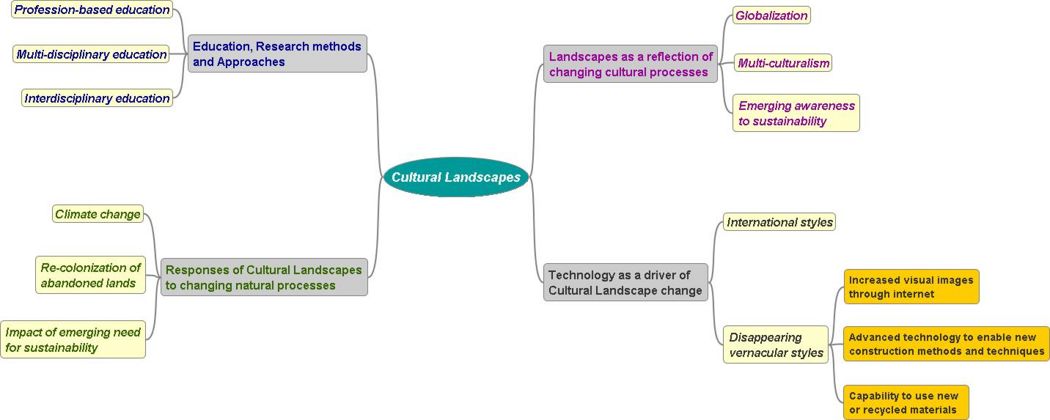Student Case Studies Seminar Cultural Landscapes 2010: Difference between revisions
Jump to navigation
Jump to search
Heike.kaiser (talk | contribs) No edit summary |
Heike.kaiser (talk | contribs) No edit summary |
||
| Line 2: | Line 2: | ||
* Dear students, please follow the given structure and add your name and | * Dear students, please follow the given structure and add '''your name''' and a short but significant '''title of your case study''' to the respective section of this list of the '''ECLAS thematic fields''' via "edit". | ||
* If your project relates to more than one theme, please copy the title to any appropriate | * If your project relates to more than one theme, please copy the title to any appropriate section. | ||
* If you think that some subthemes are missing, feel free to add | * If you think that some '''important subthemes''' are missing, feel free to add your particular subtheme to the appropriate section of the list. | ||
* Your case study will be linked with the [[Case Study Template_Cultural Landscapes 2010]] as a neutral starting point after May 11, 2010, and then you can start editing your documentation (publishing exercise) | * Your case study will be linked with the '''[[Case Study Template_Cultural Landscapes 2010]]''' as a neutral starting point after May 11, 2010, and then you can start editing your '''online documentation (publishing exercise)''' | ||
Revision as of 12:18, 11 May 2010
- Dear students, please follow the given structure and add your name and a short but significant title of your case study to the respective section of this list of the ECLAS thematic fields via "edit".
- If your project relates to more than one theme, please copy the title to any appropriate section.
- If you think that some important subthemes are missing, feel free to add your particular subtheme to the appropriate section of the list.
- Your case study will be linked with the Case Study Template_Cultural Landscapes 2010 as a neutral starting point after May 11, 2010, and then you can start editing your online documentation (publishing exercise)
Thematic fields according to the 2010 ECLAS conference "Cultural Landscapes"
Cultural Landscapes: Education, research methods and approaches
Profession-based education
- Student: Title, Country
Multi-disciplinary education
- Student: Title, Country
Interdisciplinary education
- Student: Title, Country
Group synthesis Education, research methods and approaches
Responses of cultural landscapes to changing natural processes
Climate change
- Student: Title, Country
Re-colonization of abandoned lands
- Student: Title, Country
Impact of emerging need for sustainability
- Student: Title, Country
Group synthesis Responses to changing natural Processes
Landscapes as a reflection of changing cultural processes
Globalization
- Student: Title, Country
Multiculturalism
- Student: Title, Country
Merging awareness to sustainability
- Student: Title, Country
Group synthesis Reflection of changing cultural processes
Technology as a driver of cultural landscape change
International styles
- Student: Title, Country
Disappearing vernacular styles as a result of increased visual images through internet
- Student: Title, Country
Disappearing vernacular styles as a result to advanced technology to enable new construction methods and techniques
- Student: Title, Country
Capability to use new materials or recycled materials
- Student: Title, Country
